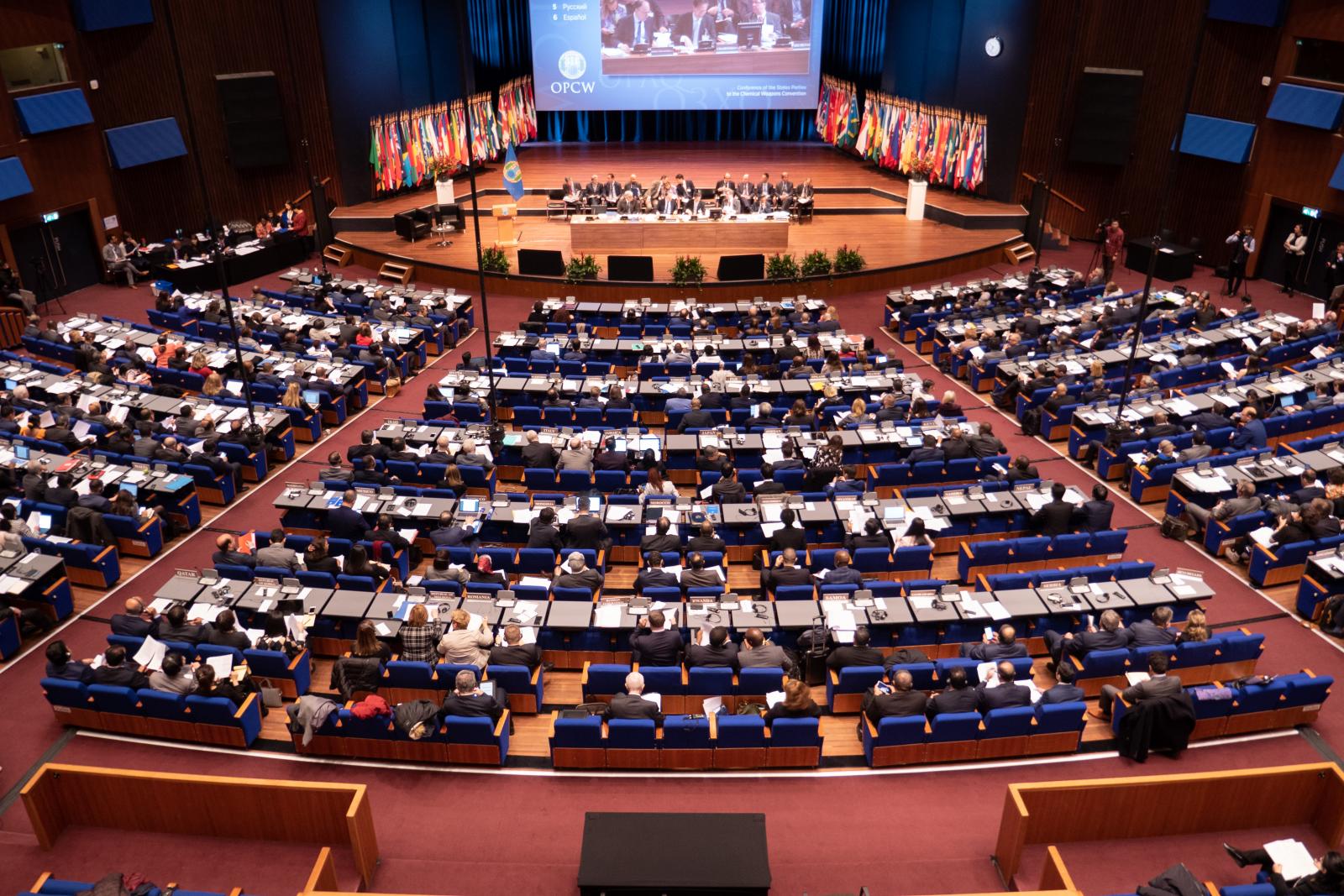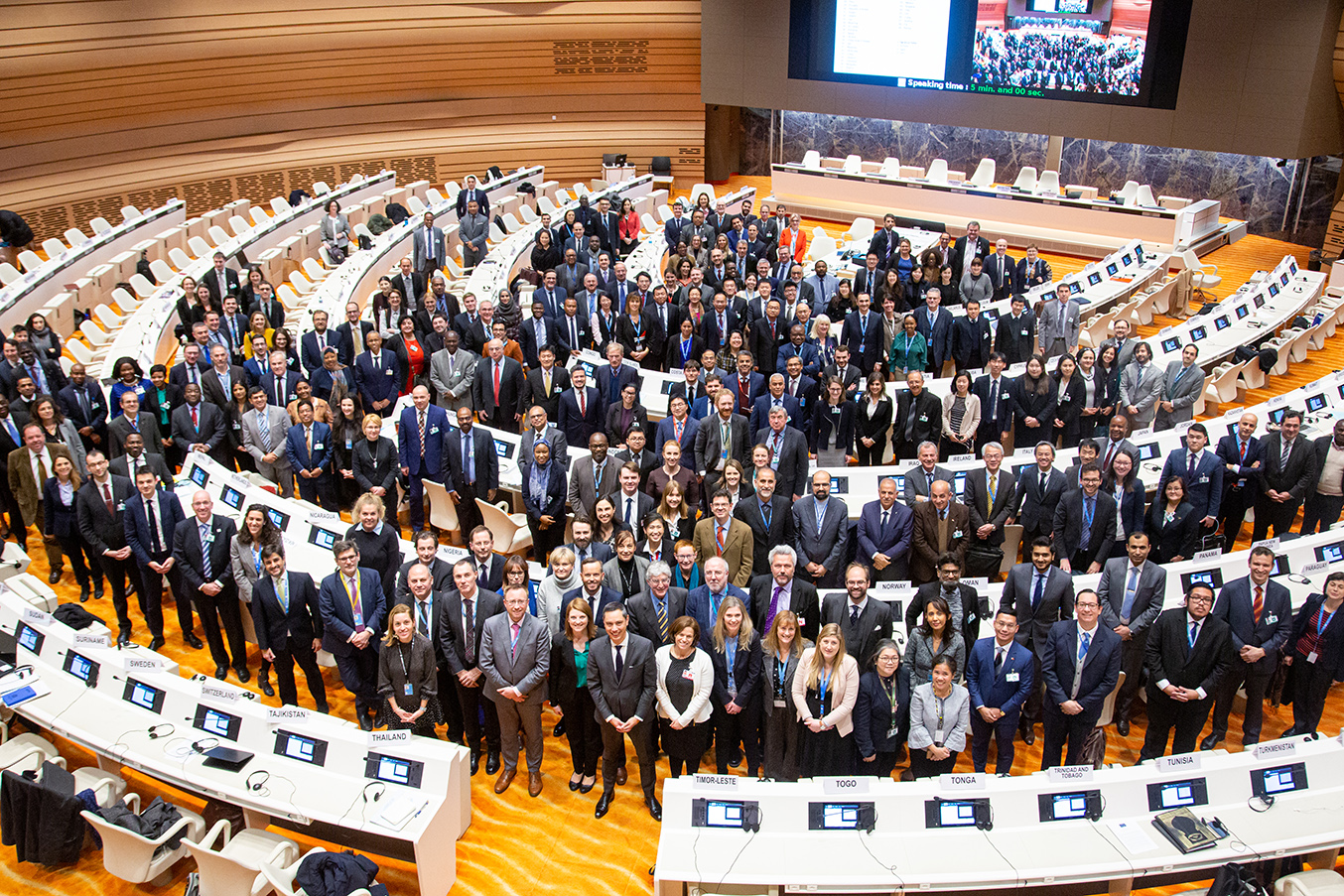COVID-19 interferes with CWC and BTWC meeting schedules
COVID-19 is messing up the diplomatic disarmament and arms control agendas.
On 27 March Ambassador Gustavo Zlauvinen from Argentina announced as President-Designate the postponement of the 10th Review Conference of the Nuclear Non-Proliferation Treaty (NPT). Initially scheduled for 27 April – 22 May 2020, it was to take place by April 2021. The deadline was moved up to August. However, because of the United Nation’s original schedule of meetings for 2021 combined with the many rescheduled meetings of this year, the only possible opening in the agenda was an impractical slot from 4 to 29 January. The pandemic’s resurgence in the autumn made this an all but impossible proposition. In a letter dated 28 October, he informed NPT states parties of new provisional dates (2–27 August) assuming a return to pre-pandemic levels of activity by the UN Secretariat.
Likewise, the second session of the Conference on the Establishment of a Middle East Zone Free of Nuclear Weapons and Other Weapons of Mass Destruction was due to take place this month. In September participants delayed the meeting by one year.
Now the meetings of the Chemical Weapons Convention (CWC) and Biological and Toxin Weapons Convention (BTWC) too require major rescheduling.
The CWC: A Conference of States Parties in two acts
The Organisation for the Prohibition of Chemical Weapons (OPCW) will hold the 25th session of the Conference of the States Parties (CSP) on 30 November and 1 December and then reconvene for the remainder of its work not later than 30 April 2021.

All autumn there was consideration in what format the CSP might convene. The Rules of Procedure do not allow for a purely virtual meeting. Rule 9 requires that a CSP takes place at the OPCW seat. While the CSP can decide on another location, it still presupposes that all states parties gather at a single place. The rules require that the state party representative be (physically) present in the meeting to cast a vote.
The need to have a programme and budget for next year closed out the alternative of postponing the CSP until sometime early in 2021, hence the decision to split the conference into two parts. Under Rule 11 the CSP may adjourn a session temporarily and resume the meetings later.
The 2021 programme and budget is the most significant agenda item for the first part of the CSP, according to the tentative programme of work. Consideration will begin in the morning of 30 November and resume in the afternoon of 1 December. While the Executive Council already agreed on the programme and budget (by majority vote), Russia and Syria, possibly supported by Iran and China and some other states parties, will probably vote against the proposal. They object to the financing of the Investigation and Identification Team set up in June 2018 to identify the perpetrators of chemical weapon (CW) use in Syria.
Rule 69 states that a decision on a matter of substance should as far as possible be taken by consensus. Absent consensus, the vote shall be deferred for 24 hours, during which facilitation to achieve consensus will take place. If unsuccessful within the foreseen time frame, then the states parties present and voting will decide by a two-thirds majority.
This rule explains why the first part of the CSP will run over two days. The anticipated rejection of the programme and budget by some OPCW members and the 24-hour frame for consultations likely explain why no formal meetings are scheduled for the Monday afternoon and Tuesday morning.
The tentative programme of work foresees that the threat from CW use will be taken up in the second part of the CSP. Under this subitem states parties will consider whether Syria has fulfilled the demands for full transparency about its CW programmes and activities set by the Executive Council last July.
- All documents for CSP 25, including national statements and statements by non-governmental organisations are available here.
The BTWC: a cascade of postponements?
Between review conferences parties to the BTWC participate in the so-called intersessional process, a series of sessions comprising the Meetings of Experts (MXs) during the summer and the Meeting of States Parties (MSP) towards the end of the year. COVID-19 wreaked havoc on meeting planning and preparations.
This year, the five MXs had been scheduled for 25 August – 3 September. On 28 July, Chairperson of the 2020 MSP, Ambassador Cleopa Mailu of Kenya notified all states parties that the MXs would be moved to 1–10 December. He also wrote that the MSP, originally planned for 8–11 December, would be rescheduled for 12–15 April 2021. The first session of the Preparatory Committee for the 9th Review Conference would take place immediately afterwards, on 16 April.

Especially the delay of the MSP has consequences for the Review Conference preparations because this would have been when states parties decide on the first arrangements, such as when the Preparatory Committee will convene and the Review Conference dates. The 2019 MSP decided that the Review Conference shall take place in November 2021 without specifying exact dates.
The notification of the date for the first session of the Preparatory Committee indicates that Ambassador Mailu had consulted with the states parties on this issue given there would not be an MSP this year. He also informed states parties of the tentative scheduling of the second session of the Preparatory Committee between 16 and 20 August 2021, pending a formal decision by the MSP now set for April.
However, on 23 November the MSP Chairperson addressed a new letter to the states parties informing them that the MXs will be postponed again to a date not earlier than April 2021.
This has knock-on effects for the MSP and both Preparatory Committee meetings. Ambassador Mailu has indicated that he will propose a new schedule for the meetings in 2021 before the end of the year.
Several sources have indicated that the Review Conference itself might be delayed until 2022.
- The landing page for the documents of the five MXs is here. The BTWC Implementation Support Unit organised in November an informal webinar on each MX. The presentations, pre-recorded videos by academic experts and the webinar recordings are available under the tabs in the left margin.
- Documents from previous BTWC meetings are available here.

3 Comments
Новости Biodefense – 13 декабря 2020 г. – Nachedeu
[…] COVID-19 сеет хаос в повестке дня дипломатического разоружения и контроля над вооружениями на 2020 год. Существенное изменение графика повлияло на заседания Конвенции о химическом оружии (КХО) и Конвенции о биологическом и токсинном оружии (КБТО), при этом Совещание экспертов государств-участников КБО было недавно отложено до не ранее апреля 2021 г. Траншея […]
Biodefense Headlines – 13 December 2020 | taktik(z) GDI
[…] COVID-19 is wreaking havoc on the diplomatic disarmament and arms control agendas for 2020. Major rescheduling has impacted the Chemical Weapons Convention (CWC) meetings and Biological and Toxin Weapons Convention (BTWC), with the BWC States Parties Meeting of Experts being recently postponed to not earlier than April 2021. The Trench […]
Biodefense Headlines – 13 December 2020 - Global Biodefense - Biohealth Reviews
[…] COVID-19 is wreaking havoc on the diplomatic disarmament and arms control agendas for 2020. Major rescheduling has impacted the Chemical Weapons Convention (CWC) meetings and Biological and Toxin Weapons Convention (BTWC), with the BWC States Parties Meeting of Experts being recently postponed to not earlier than April 2021. The Trench […]